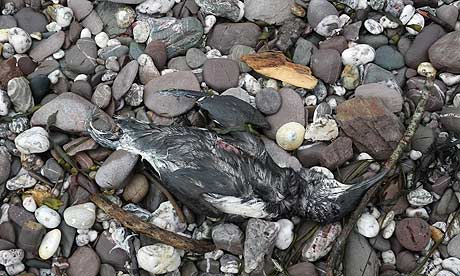The chemical that caused the deaths of thousands seabirds in the UK earlier this year has been banned from being discharged at sea by the International Maritime Organisation (IMO).
More than 4,000 birds of at least 18 species washed up dead or were affected by a sticky substance covering beaches from Cornwall to Dorset in two separate incidents in January and April this year.
An investigation by the UK government's Maritime and Coastguard Agency (MCA) confirmed that the chemical responsible was polyisobutylene (PIB), an oil additive that is flushed into the sea during the cleaning of a ship's tanks or flushing of ballast water.
Although it is considered to present a hazard to the marine environment, until now it has been legal to discharge it in restricted quantities into the sea under certain circumstances.
However, at a meeting of the IMO's working group on the Evaluation of Safety and Pollution Hazards of Chemicals in London on Tuesday, it was announced that from 2014 all high-viscosity PIBs will be reclassified under a separate category that bans their discharge at sea and requires tanks to be fully pre-washed and all residues to be disposed of at port. This will also apply to new "highly reactive" forms of PIB, which are currently being transported unassessed.
PIB is often used to improve the performance of lubricating oil and is found in products ranging from adhesives to sealants and chewing gum. It is extremely hazardous to seabirds, who dive underwater to feed and become covered in the sticky substance. This leads to immobilisation, hyperthermia, starvation and eventually death.
Wildlife charities have been campaigning for a change to the maritime law that governs polluting substances and more than 25,000 people signed petitions in support of a ban.
Alec Taylor, marine policy officer for the RSPB said: "We are delighted with the action taken by the IMO. The global trade in PIB products is increasing and with it the risks to our precious marine environment. Today's global ban on the deliberate discharge of high viscosity PIBs into our seas is a real step forward and one that we hope will end this particular pollution threat to seabirds and other marine life."
RSPCA senior wildlife scientist Adam Grogan said: "We welcome this decision. Our staff worked around the clock washing and treating these poor birds in January and April and it was heartbreaking seeing the pitiful state they were in. Hopefully this will help stop incidents like these happening again, and save wildlife from suffering and dying like this in the future."
Joan Edwards, head of living seas at the Wildlife Trusts, welcomed the ban and said the risk of pollution was a threat to tourism on popular beaches, as well as to marine life.
The two spills earlier this year represented the second largest marine pollution incident of its kind in the region. Affected species included razorbill, puffin and gannets, but predominantly guillemots. Wildlife agencies in Devon and Cornwall said that "a whole generation of seabirds" may have been wiped out.
http://www.theguardian.com/environment/2013/oct/22/chemical-seabird-deaths-banned-pib/print


